|
|
|
Sort Order |
|
|
|
Items / Page
|
|
|
|
|
|
|
| Srl | Item |
| 1 |
ID:
152489
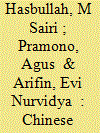

|
|
|
|
|
| Summary/Abstract |
This paper provides new statistics to the debate on percentage of Chinese Indonesians, using the latest 100% data set of the 2010 population census. It reveals that the statistics is closer to the low side of the debate, less than 2.0%, rather than the high side of 3.0% and more. Ethnicity is here self-defined by the respondents. With 1.2%, the Chinese Indonesians ranked as the 15th largest group of more than 600 ethnic groups. This paper also produces statistics at the district level, the first ever statistics on Chinese Indonesians. It finds that some provinces and districts have large percentages of Chinese Indonesians, but the respective total population are relatively small to the total Indonesia’s population. Majority of provinces and districts (25 out of 33 provinces and 415 out of 497 districts) have lower percentage of Chinese than the national figure.
|
|
|
|
|
|
|
|
|
|
|
|
|
|
|
|
| 2 |
ID:
076400


|
|
|
|
|
| Publication |
2007.
|
| Summary/Abstract |
Throughout periods of political instability and economic adversity - from Dutch colonial rule, through President Suharto's period in office, to more recent times - ethnic Chinese in Indonesia have been recurrent scapegoats for violence. Suharto, especially, manipulated local perceptions of the Chinese in the economic and political arenas, to suit the needs of his government. Yet, circumstances have changed since the 1998 riots in Indonesia and Suharto's departure. Subsequent presidents have introduced legislation aimed at reducing legal restrictions on Chinese Indonesians and they, in turn, are beginning to have greater public voice through a diversity of outlets. These include the growth of numerous new print and television media; a flourishing literature sphere; the rise of a variety of political parties, both ethnicity-based and more wide-ranging; and the development of non-political organisations, some tackling discrimination and others focusing upon Chinese sociocultural needs. These channels are facilitating the appearance of new and re-emerging ethnic Chinese identities, some surfacing from over 30 years of imposed dormancy. This paper is a preliminary investigation of manifestations of these identities among ethnic Chinese in Indonesia's contemporary public realm.
|
|
|
|
|
|
|
|
|
|
|
|
|
|
|
|
| 3 |
ID:
114682
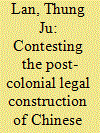

|
|
|
|
|
| Publication |
2012.
|
| Summary/Abstract |
The legal construction of the Chinese Indonesians in post-Independence Indonesia, particularly during Suharto's New Order, is reflected in the so-called SBKRI - Surat Bukti Kewarganegaraan Republik Indonesia (the Republic of Indonesia Citizenship Certificate). The certificate reproduces the colonial racism that divided the population of the Dutch East Indies into three racial categories, namely the Europeans on the top of the ladder, the Foreign Orientals (Chinese, Indian, and Arab) in the middle, and the Inlanders (or natives) at the lower end. In this paper, I problematize the basic principle of the Indonesian Constitution that 'all (Indonesian) citizens have equal rights in the eyes of the law' for the case of Chinese Indonesians. Even though the chapter on citizenship in the 1945 Constitution has been amended twice, I believe the amendment did not correct the racism embedded within.
|
|
|
|
|
|
|
|
|
|
|
|
|
|
|
|
| 4 |
ID:
191780
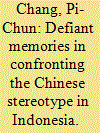

|
|
|
|
|
| Summary/Abstract |
This study considers Batavia’s first Chinese captain, Souw Beng Kong (1580–1644) as an example of the memory politics of urban Chinese Indonesians in Jakarta. It explores how and why he has been remembered in the contemporary era. While the stereotype of Chinese Indonesians has its roots in the Dutch colonial period, this study takes the Dutch institution of the captain as a framework to examine what is remembered as a way to bind group members together in a shared community of memory. This study argues that remembering Souw represents an implicit but defiant response to a long-standing negative stereotype that the ethnic Chinese in Indonesia are perennially alien outsiders.
|
|
|
|
|
|
|
|
|
|
|
|
|
|
|
|
| 5 |
ID:
191778
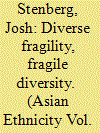

|
|
|
|
|
| Summary/Abstract |
Attending to postwar Chinese-language letters in Indonesia and the Philippines reveals a stronger tendency to write within a discourse of long-distance cultural nationalism than in hybrid or local modes. Omitting cultural nationalist discourses from a view of the corpus risks skewing accounts of Sinophone production, since many authors who write in Chinese have been receptive to ethnic, cultural, and even political appeals from China. This result is also ironic, in that it is specifically production in Chinese (rather than in imperial or archipelagic languages) which is most in tension with the postmodern and postcolonial bent of the Sinophone turn. As an open system for interrogating essentialist definitions of ‘Chineseness’, Sinophone Studies should also accommodate the culturally (and sometimes politically) orthodox ‘Chinese’ strands of Southeast Asian writing. Considering non- or less-hybrid strands of the corpus in turn opens new avenues for understanding the region’s Sinophone cultural production as the result of a rich, politically diverse network with considerable scope for comparative intraregional study.
|
|
|
|
|
|
|
|
|
|
|
|
|
|
|
|
| 6 |
ID:
116569
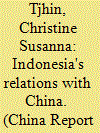

|
|
|
|
|
| Publication |
2012.
|
| Summary/Abstract |
This article looks into the recent development of Indonesia's relations with China. Notable progress can be seen in political and security relations, despite the fact that this dimension was at the core of their contentions during the 1970s and caused a freeze in diplomatic relations until the early 1990s. Economic relations, on the other hand, have long been the backbone of relations even before normalisation, but after Reformasi, economic relations have gradually been depicted as a new kind of threat even as they flourish. A unique factor contributing to this relationship is the distinctive role of Chinese Indonesians. This article also considers participation in multilateral diplomacy as an important aspect and strategy that affect bilateral relations. Under democracy, Indonesia is able to formulate a more productive and pragmatic China policy. However, since productive and pragmatic relations are not sufficiently strategic, Indonesia needs to formulate a long-term strategy to engage China and substantiate the so-called strategic partnership.
|
|
|
|
|
|
|
|
|
|
|
|
|
|
|
|
| 7 |
ID:
165950
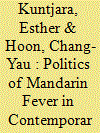

|
|
|
|
|
| Summary/Abstract |
The fall of Suharto in 1998 opened up a new space for the public articulation of Chinese identity in Indonesia. Since the decrees that lifted the ban on Chinese language, Mandarin classes have had an unprecedented boom. This paper reflects on this phenomenon in the geopolitical context of the economic rise of China and its promotion of soft power, as well as the market forces that reward Mandarin competency in contemporary Indonesia.
|
|
|
|
|
|
|
|
|
|
|
|
|
|
|
|
| 8 |
ID:
191781
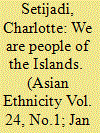

|
|
|
|
|
| Summary/Abstract |
The Riau Islands Chinese are an anomaly in the study of Chinese Indonesians. For one, while many of their ethnic Chinese counterparts in other parts of Indonesia can no longer speak Chinese due to the New Order regime’s assimilation policy, Chinese languages are alive and well in the Riau Islands. Based on ethnographic fieldwork conducted in 2017–2018, this paper seeks to understand the Riau Islands Chinese’s cultural resilience and sense of belonging as a borderland ethnic minority. I argue that long-standing inter-Island and cross-border mobilities and cultural flows with Singapore have been central to the maintenance of Riau Islands Chinese identity. Utilising translocality as a theoretical framework to understand the processes of identity formation and place-making that transcend national borders, I contend that the case study of the Riau Islands Chinese challenges the conventional state-centric modes of analyses prevalent in the study of ethnic Chinese communities in Southeast Asia.
|
|
|
|
|
|
|
|
|
|
|
|
|
|
|
|
|
|
|
|
|